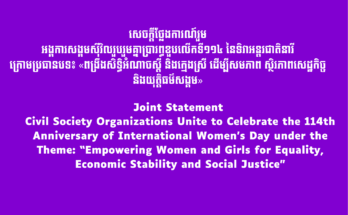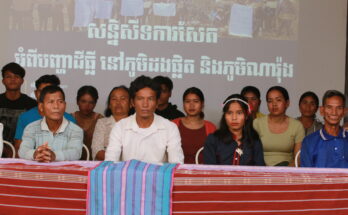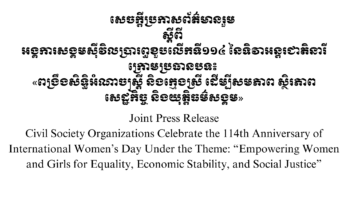Since the end of 2006 ADHOC has been running the Khmer Rouge Trials and International Criminal Court Program in order to ensure that the Extraordinary Chambers in the Courts of Cambodia (ECCC) succeeds in delivering justice to the victims of the Khmer Rouge, and to seek safeguards that will prevent the perpetration of similar mass crimes in the future. ADHOC is committed to continuing its activities related to the KRT at least for the duration of case 002.
Outreach: ADHOC has been the first and arguably the principal NGO to make the ECCC’s mandate known to “ordinary” Cambodians throughout the country. Some 103,000 women and men from almost all districts, including ‘multipliers’ such as local officials, teachers and monks, have taken part in participatory outreach workshops on the ECCC. Appropriate print materials and regular radio broadcasts, considered the most effective tools to reach rural areas, have spread information on the ECCC and on options for psychological/social support. Recent studies suggest that 61% of the total population know about the ECCC; the Trials appear to generate interest and discussions even far from Phnom Penh.
Civil Parties: Victims admitted as Civil Parties (CP) enjoy rights in Court that are similar to the rights of the Prosecutors and the Defendants; i.e., they are allowed to participate in a way that can shape the course of the Trial. ADHOC and its partners have grasped the unique opportunity offered by the ECCC’s hybrid nature – its rooting both in Cambodian and international law –, and conducted constructive advocacy and lobbying to prompt the necessary revisions in the ECCC rules. ADHOC’s facilitating of encounters between victims and CP lawyers has also been instrumental in putting gender-based and sexual crimes onto the ECCC agenda.
Teething problems around Civil Participation are to be expected; however, ADHOC and its partners have helped to find a viable compromise between CP rights and the need to avoid long delays in ECCC proceedings.
In Case 001 ADHOC assisted 33 civil parties, either survivors or victims, who had lost relatives at the notorious S-21 security center. ADHOC also worked closely with other NGOs in the CHRAC network to provide various support services to those civil parties, and supported those civil parties by inviting them to monthly meetings with their lawyers, conducting advocacy on their behalf and giving them the opportunity to attend the first trial on a regular basis. In February 2012 the Supreme Court Chamber sentenced Duch to life imprisonment for crimes against humanity and grave breaches of the 1949 Geneva Conventions.
Case 002: Since April 2010 ADHOC has re-focused its project primarily to allow for meaningful participation for civil parties before the ECCC in Case 002. Almost half of all civil parties, 1,791, admitted in Case 002 have either chosen ADHOC as their intermediary organization of choice or have received assistance from ADHOC in order to participate in the ECCC’s legal proceedings. ADHOC is also the only NGO who provides assistance to civil parties in Cambodia’s most remote provinces of Rattanakiri, Mondulkiri and Oddar Meanchey.
Considering the high number of civil parties, ADHOC devised a Civil Party Representative Scheme whereby a Civil Party Representative (CPR) is either elected or appointed from amongst the Civil Parties in a particular area to facilitate communications between each individual victim and either other victims, ADHOC, their respective Civil Party Lawyers or the ECCC itself.
Essentially, the 122 CPRs act as the nexus between civil parties, the court and the lawyers to ensure that civil parties are provided with sufficient information are regularly updated on the latest developments in Case 002. In the long term, local civil party groups may initiate their own activities to overcome the tragedy of the Khmer Rouge past.
Another important step towards empowering survivors of the KR regime has been the creation of a Victims’ Association, Ksem Ksan, supported by ADHOC with legal advice and free meeting spaces.



